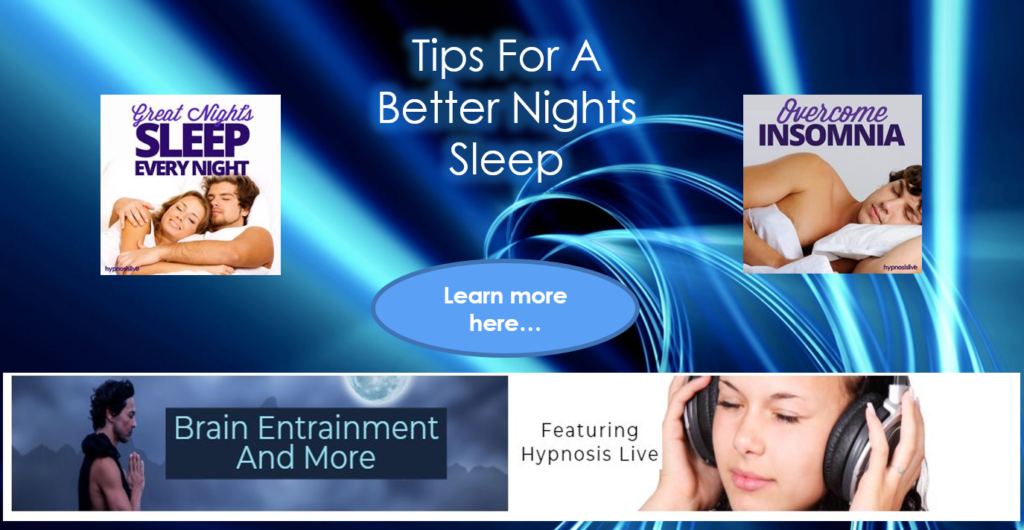Learn why you need these Tips For a Better Nights Sleep such as relaxation, sleep schedules, and of course our favorite natural option – Sleep Hypnosis!
Why You Need a Great Nights Sleep
You understand that a lack of sleep can make you cranky and hazy. You may be unaware of its effects on your sexual life, memory, health, appearance, and even your ability to lose weight.
Here are some unexpected – and significant – consequences of sleep deprivation.
- Sleep is essential for brain function and systemic physiology in many bodily systems.
- Sleep issues are common and involve deficiencies in both the amount and quality of sleep.
- Sleep disorders that affect sleep continuity are referred to as sleep disturbances.
- Sleep disturbance has both short- and long-term health implications.
- Sleep disruption is caused by various circumstances, ranging from lifestyle and environmental variables to sleep disorders and other medical diseases.
Utilizing the tips for a better nights sleep you will read below will dramatically improve all facets of your life!
Sleep is a biological activity that is required for survival and maximum health. Sleep is essential for brain function and systemic physiology, including metabolism, hunger management, and immunological, hormonal, and cardiovascular system function.
What is a Sleep Disturbance and Sleep Deprivation?
Sleep disturbance is common. According to a 2014 National Sleep Foundation poll, 35% of American adults assessed their sleep quality as “bad” or “just fair.” Forty-five percent of respondents had difficulty falling asleep at least one night each week.
Furthermore, 53% of respondents experienced difficulty sleeping on at least one night in the preceding week, and 23% had poor success sleeping on five or more nights.
Snoring was noted by 40% of respondents. A physician had advised 17% that they have a sleep condition, the majority (68%) of which was sleep apnea.
There has been little research on sleep disturbance in children. The total prevalence of chronic sleep disturbance was 9.8 percent in the study that included a random sample of Chinese children aged 5–12 years (boys, 10.0 percent; girls, 8.9 percent )
Sleep deprivation appears to raise the risk of some malignancies and mortality. Sleep disturbance has long-term implications in otherwise healthy people, including hypertension, dyslipidemia, CVD, weight-related disorders, metabolic syndrome, and T2DM. Sleep deprivation may also exacerbate the symptoms of some gastrointestinal illnesses.
Sleep deprivation can have an impact on how we understand events. This impairs our capacity to make intelligent decisions since we may not correctly appraise possibilities and act on them.
Not Getting Enough Sleep is NOT a Badge of Honor!
Working on less sleep has become a kind of badge of pride in our increasingly fast-paced environment. However, sleep experts caution that you're sorely mistaken if you believe you're doing great on less sleep. Sleep-deprived persons appear to be more prone to poor judgment when it comes to estimating the effects of sleep deprivation. And work in a job where your ability to gauge your level of functioning is critical. This can be a significant issue.
Studies have confirmed that folks who receive six hours of sleep instead of seven or eight tend to feel that they've adapted to that sleep deprivation and become accustomed to it.
However, when it comes to measures of mental alertness and performance, they continue to deteriorate. So, when we are sleep-deprived, we lose touch with how impaired we are.
Tips for a Better Nights Sleep!
Tossing and turning all night is NOT your cross to bear forever! Consider easy sleep methods, such as creating a sleep plan and incorporating physical activity into your daily routine.
Creating a Bedtime Routine For a Good Nights Rest
It's normal to believe that if you have trouble falling asleep, the problem begins when you lie down in bed. In actuality, the period leading up to tonight is critical in preparing you to fall asleep fast and easily.
Poor pre-bedtime routines are a fundamental cause of insomnia and other sleep issues. Changing these habits takes time, but the work can pay off by making you more calm and ready to sleep when evening arrives.
Try to establish a consistent pattern that you follow each night as much as possible. A strict and consistent pattern reinforces healthy behaviors and signals that bedtime is approaching to the mind and body. Include the following three suggestions as part of your routine:
Relax for at least 30 minutes before bedtime:
When you are relaxed, it is much simpler to fall asleep. Quiet reading, low-impact stretching, listening to soothing music, and relaxation techniques are all examples of strategies to prepare for sleep.
Reduce your exposure to bright light:
Avoiding bright light will assist you in transition to nighttime and contribute to your body's synthesis of melatonin, a hormone that promotes sleep.
Disconnect from Devices:
Tablets, mobile phones, and laptop computers may keep your head electrified, making it difficult to relax completely. The light from these devices can also reduce your natural melatonin synthesis. Try to disconnect for 30 minutes or longer before going to bed as much as feasible.
If You Can't Get To Sleep 
Work stress, family duties, and diseases can disrupt a good night's sleep. It's no surprise that getting enough sleep may be difficult at times.
You may not be able to control the circumstances that disrupt your sleep. You may, however, develop behaviors that promote better sleep.
It may be difficult to fall asleep when you first go into bed or wake up to a noise or a toilet break through the night. Here are some helpful hints that will help you figure out what to do if you can't sleep:
Try Relaxation Techniques:
Instead of concentrating on falling asleep, focus on relaxing. Relaxation practices that can help you sleep include controlled breathing, mindfulness meditation, progressive muscle relaxation, and guided imagery.
Don't Stew in Bed:
You want to avoid creating a mental link between your bed and your aggravation from lack of sleep. This implies that if you've been in bed for roughly 20 minutes and still haven't fallen asleep, you should get up and out of bed and do something calming. It would help if you stayed out of any bright lights during this time and definitely did not watch the clock. Before attempting to go back to bed, try to divert your attention away from sleep for at least a few minutes.
Our Most Recommended Tips for a Better Nights Sleep is Recorded, Self Led Hypnosis!
 Brain entrainment hypnosis is all about training your brain to reproduce the exact and precise environment to create an optimum state for whatever you desire. In the case of getting to sleep fast, these almost magic hypnosis recordings work effectively and swiftly to put your brain in the exact state it needs to be in order for sleep to be easily attained. It does this no matter what impacts or distractions you may be experiencing. Such is the wonder of these recordings. They also could not be simpler to use! All you need to do, is download the file, slip on your favorite headphones and then lay back and relax, letting the Great Nights Sleep recording do its job!
Brain entrainment hypnosis is all about training your brain to reproduce the exact and precise environment to create an optimum state for whatever you desire. In the case of getting to sleep fast, these almost magic hypnosis recordings work effectively and swiftly to put your brain in the exact state it needs to be in order for sleep to be easily attained. It does this no matter what impacts or distractions you may be experiencing. Such is the wonder of these recordings. They also could not be simpler to use! All you need to do, is download the file, slip on your favorite headphones and then lay back and relax, letting the Great Nights Sleep recording do its job!
Experiment with Various Methods:
Sleeping issues may be complex, and what works for one individual may not work for another. As a consequence, it makes sense to experiment with several of these tips for a better nights sleep and work out the best methods for you. It's best always to remember that new approaches might take some time to take effect. It would be best to allow your adjustments some time to take effect before concluding that they aren't working for you.
Keep a Sleep Diary:
Keeping a regular sleep journal will help you track how well you sleep and uncover variables that may affect your slumber. Keeping a sleep journal might help you track how well it's going if you are experimenting with a refreshed sleep schedule or other nighttime modifications.
Consult a Doctor:
A doctor is an ideal person to give specific counsel and tips for a better nights sleep to persons with trouble sleeping. Consult your doctor if your sleep issues worsen or if they continue to haunt you over time. Any other lack-of-sleep symptoms that can harm your health and safety (for example, excessive daytime drowsiness) should be reported and discussed with a health professional.
The post Tips For a Better Nights Sleep appeared first on https://gqcentral.co.uk



